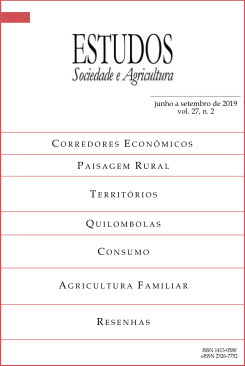The good that is missing from the basket: handicrafts in the Quarta Colônia territory
O bem que falta na cesta: o artesanato no território Quarta Colônia, RS
DOI:
https://doi.org/10.36920/esa-v27n2-3Abstract
This article presents the context of handicrafts in the Quarta Colônia territory, Rio Grande do Sul, highlighting its latent potential to become a territorial asset that can be mobilized by institutional actors, especially if it is dynamized within a basket of goods and services that gravitate around the Italian as a collective identity image articulated with the asset of greatest expression and media visibility of the territory, that of gastronomy. The study has a qualitative character, with the adoption of an interpretative research approach, and the methodological approach included documentary analysis, observations and semi-structured interviews with qualified interlocutors involved in the context of Quarta Colônia handicrafts. It is understood that handicrafts can contribute to the strengthening of a composite and territorialized supply of the basket of goodstype, reinforcing the image of global quality of the Quarta Colônia territory.
Keywords: handicrafts; basket of goods and services; Quarta Colônia; territory.
MELLO, Carolina Iuva de; FROEHLICH, José Marcos. O bem que falta na cesta: o artesanato no território Quarta Colônia, RS. Estudos Sociedade e Agricultura, v. 27, n. 2, p. 282-306, jun. 2019.
Submitted in february 2019.
Accepted in april 2019.
Downloads
Downloads
Published
Issue
Section
License
Copyright (c) 2019 Carolina Iuva de Mello, José Marcos Froehlich

This work is licensed under a Creative Commons Attribution 4.0 International License.
Authors who publish in this journal agree to the following terms:
a) Authors maintain the copyright and grant the journal the right of first publication, with the work simultaneously licensed under the Creative Commons Attribution License which allows the sharing of the work with acknowledgment of authorship and initial publication in this journal.
b) Authors are authorized to take additional contracts separately, for non-exclusive distribution of the version of the work published in this journal (eg publish in institutional repository or as a book chapter), with acknowledgment of authorship and initial publication in this journal.
c) Authors are allowed and encouraged to publish and distribute their work online (eg in institutional repositories or on their personal page) at any point before or during the editorial process, as this can generate productive changes, as well as increase the impact and citation of published work (See The Effect of Free Access).






